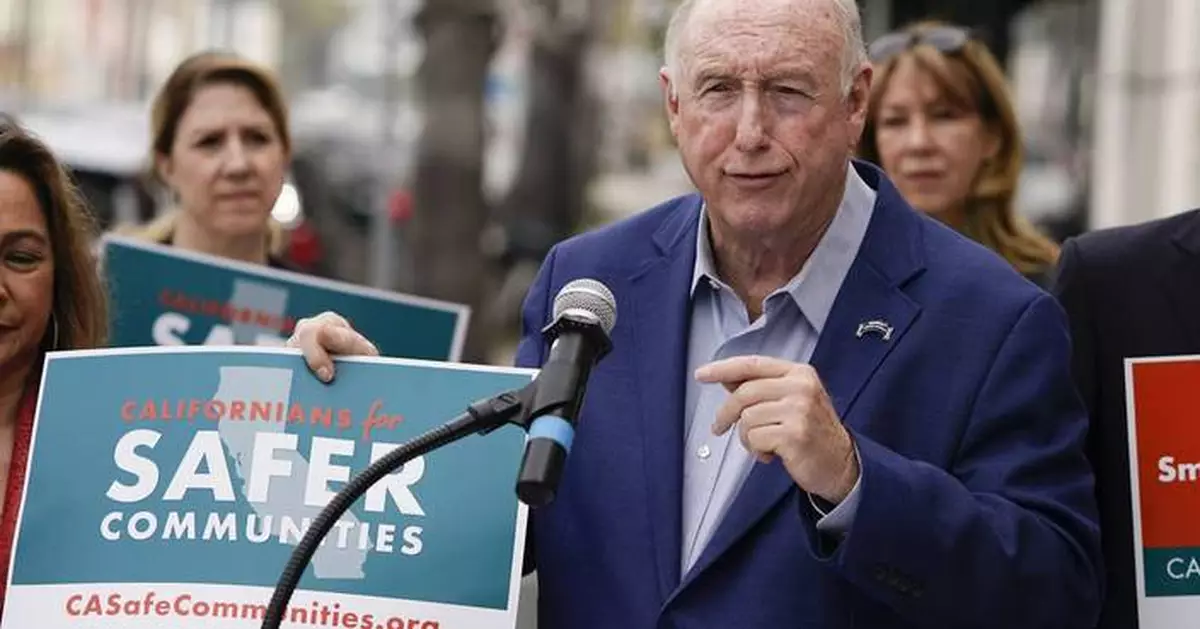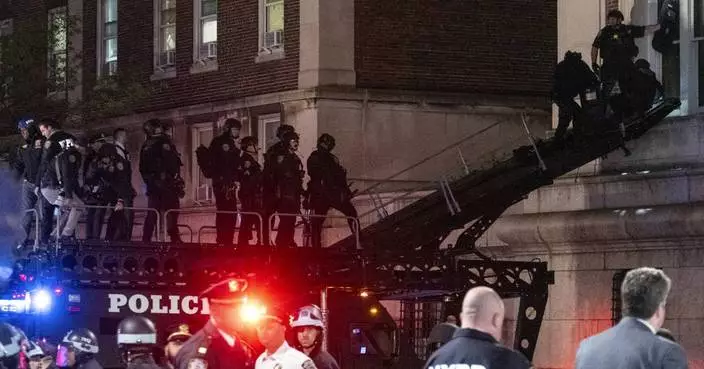SACRAMENTO, Calif. (AP) — A coalition backed by retailers like Walmart and Target announced Thursday it has collected enough signatures to put a ballot measure before California voters this November to enhance criminal penalties for shoplifting and drug dealing.
Californians for Safer Communities, a bipartisan group made up of law enforcement, elected officials and businesses, said it has collected more than 900,000 signatures in support of the measure to roll back parts of Proposition 47. The progressive ballot measure approved by 60% of state voters in 2014 reduced certain theft and drug possession offenses from felonies to misdemeanors to help address overcrowding in jails.
Click to Gallery
Tubby, the dog of former state Sen. Gloria Romero, D-Los Angeles, sits during a news conference organized by the Californians for Safer Communities Coalition, Thursday, April 18, 2024, in Culver City, Calif. The coalition, backed by retailers like Walmart and Target, announced Thursday it has collected enough signatures to put a ballot measure before California voters this November to enhance criminal penalties for shoplifting and drug dealing. (AP Photo/Ryan Sun)
Juli Shamash holds up a photo of her son, Tyler Shamash, who passed away from a fentanyl overdose in 2018, during a news conference organized by the Californians for Safer Communities Coalition, Thursday, April 18, 2024, in Culver City, Calif. The coalition, backed by retailers like Walmart and Target, announced Thursday it has collected enough signatures to put a ballot measure before California voters this November to enhance criminal penalties for shoplifting and drug dealing. (AP Photo/Ryan Sun)
SACRAMENTO, Calif. (AP) — A coalition backed by retailers like Walmart and Target announced Thursday it has collected enough signatures to put a ballot measure before California voters this November to enhance criminal penalties for shoplifting and drug dealing.
Santa Monica Mayor Phil Brock speaks at a news conference organized by the Californians for Safer Communities Coalition, Thursday, April 18, 2024, in Culver City, Calif. The coalition, backed by retailers like Walmart and Target, announced Thursday it has collected enough signatures to put a ballot measure before California voters this November to enhance criminal penalties for shoplifting and drug dealing. (AP Photo/Ryan Sun)
Tubby, the dog of former state Sen. Gloria Romero, D-Los Angeles, sits during a news conference organized by the Californians for Safer Communities Coalition, Thursday, April 18, 2024, in Culver City, Calif. The coalition, backed by retailers like Walmart and Target, announced Thursday it has collected enough signatures to put a ballot measure before California voters this November to enhance criminal penalties for shoplifting and drug dealing. (AP Photo/Ryan Sun)
Juli Shamash holds up a photo of her son, Tyler Shamash, who passed away from a fentanyl overdose in 2018, during a news conference organized by the Californians for Safer Communities Coalition, Thursday, April 18, 2024, in Culver City, Calif. The coalition, backed by retailers like Walmart and Target, announced Thursday it has collected enough signatures to put a ballot measure before California voters this November to enhance criminal penalties for shoplifting and drug dealing. (AP Photo/Ryan Sun)
Santa Monica Mayor Phil Brock listens at a news conference organized by the Californians for Safer Communities Coalition, Thursday, April 18, 2024, in Culver City, Calif. The coalition, backed by retailers like Walmart and Target, announced Thursday it has collected enough signatures to put a ballot measure before California voters this November to enhance criminal penalties for shoplifting and drug dealing. (AP Photo/Ryan Sun)
Santa Monica Mayor Phil Brock speaks at a news conference organized by the Californians for Safer Communities Coalition, Thursday, April 18, 2024, in Culver City, Calif. The coalition, backed by retailers like Walmart and Target, announced Thursday it has collected enough signatures to put a ballot measure before California voters this November to enhance criminal penalties for shoplifting and drug dealing. (AP Photo/Ryan Sun)
In recent years, Proposition 47 has become the focus of critics who say California is too lax on crime. Videos of large-scale thefts, in which groups of individuals brazenly rush into stores and take goods in plain sight, have often gone viral. The California Retailers Association said it’s challenging to quantify the issue in California because many stores don’t share their data.
Crime data shows the San Francisco Bay Area and Los Angeles saw a steady increase in shoplifting between 2021 and 2022, according to a study by the non-partisan Public Policy Institute of California. Across the state, shoplifting rates rose during the same time period but were still lower than the pre-pandemic levels in 2019, while commercial burglaries and robberies have become more prevalent in urban counties, the study says.
The ballot measure would create harsher penalties for repeat shoplifters and fentanyl dealers. Shoplifters would be charged with a felony, regardless of the amount stolen, if they have at least two prior theft convictions. It also would create a new drug court treatment program for those with multiple drug possession convictions, among other things. More than 800 people died from fentanyl overdoses in San Francisco last year, a record for the city.
California's approach to crime is poised to be a major political issue in November's election. Beyond the ballot measure, Democratic San Francisco Mayor London Breed faces a tough reelection bid against competitors who say she's allowed the city to spiral out of control. Meanwhile, Alameda County District Attorney Pamela Price faces a recall election, and Los Angeles District Attorney George Gascón faces a challenger who has criticized his progressive approach to crime and punishment.
Top Democratic state leaders, including Gov. Gavin Newsom, have repeatedly shut down calls to repeal Proposition 47. Newsom argued California already has tools to sufficiently go after criminals and urged lawmakers to bolster existing laws and go after motor vehicle thefts and resellers of stolen merchandise. Lawmakers have introduced a slew of bills aiming to tackle retail theft and online resellers.
Opponents of the ballot initiative called the effort a misinformation campaign by giant retailers that would undo criminal justice progress in the state.
“We must invest in smart solutions that prevent retail theft and promote long-term public safety, not the same failed strategies that exploded our prison populations and cost taxpayers billions without making our communities safer,” Cristine Soto Deberry, executive director of Prosecutors Alliance of California, said in a statement.
The ballot measure campaign, which has raised at least $5.4 million as of early April, is mostly funded by large retailers. It has received $2.5 million from Walmart, $1 million from Home Depot and $500,000 from Target. The measure also has support from district attorneys and more than 30 local elected officials — including Breed and San Jose's Democratic mayor.
Lana Negrete, vice mayor of Santa Monica and a business owner, said she's considering closing down her family's two music stores in the area after nine smash-and-grabs in the last four years. Negrete, a Democrat, said she voted for Proposition 47 and supported its progressive approach, but the measure has allowed for some criminals to skirt punishments while businesses are hurting.
“Nobody's being held accountable,” Negrete said. “We’ve been robbed by the same person more than once, and that person, under the current structure and criminal justice system now, is walking the streets free.”
Her 52-year-old family business has lost more than $300,000 in merchandise loss and building repairs in the last few years, Negrete said. Some have advised Negrete start hiring armed security.
“We teach music lessons to children, I don’t need to have a guard in front of my store,” she said. “That’s not how it was when we started this business, and it’s sad to see it go that way.”
County and state officials must now verify the signatures before the measure is officially placed on the ballot. The ballot measure campaign needs at least 546,651 signatures to qualify for the November ballot.
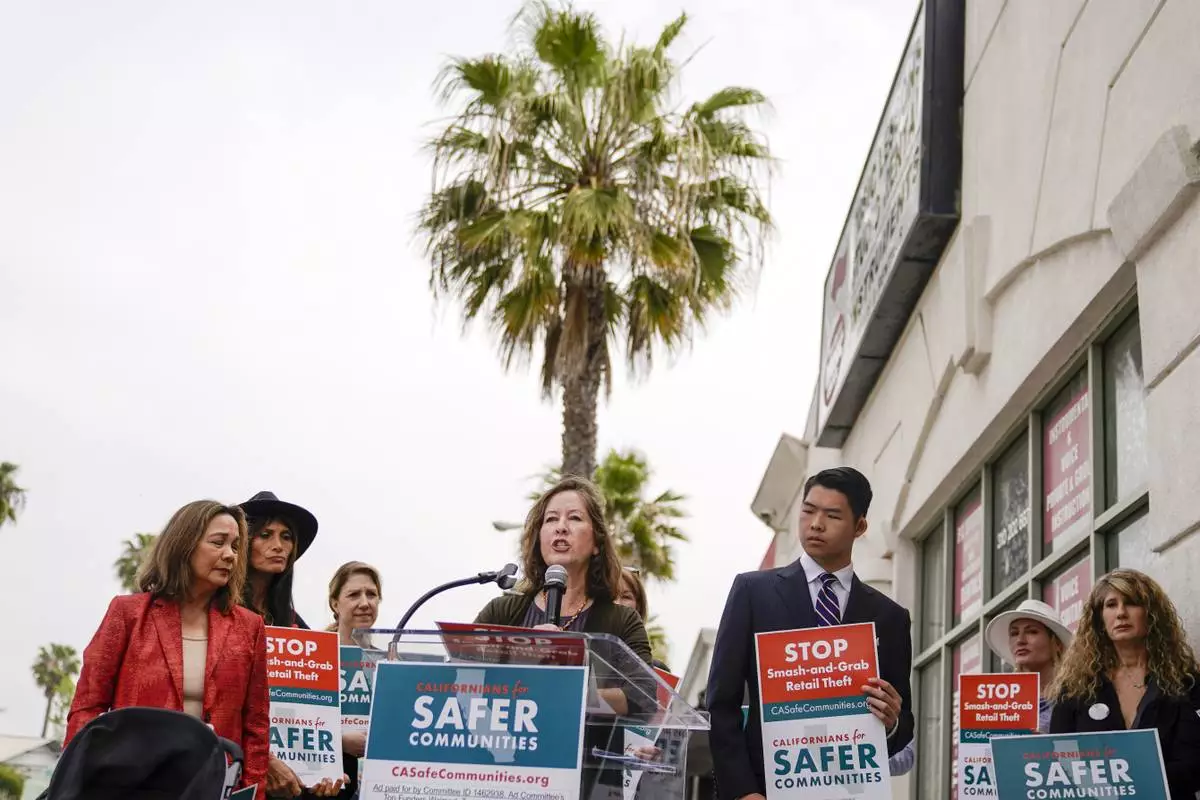
Former state Sen. Gloria Romero, D-Los Angeles, speaks during a news conference organized by the Californians for Safer Communities Coalition, Thursday, April 18, 2024, in Culver City, Calif. The coalition, backed by retailers like Walmart and Target, announced Thursday it has collected enough signatures to put a ballot measure before California voters this November to enhance criminal penalties for shoplifting and drug dealing. (AP Photo/Ryan Sun)
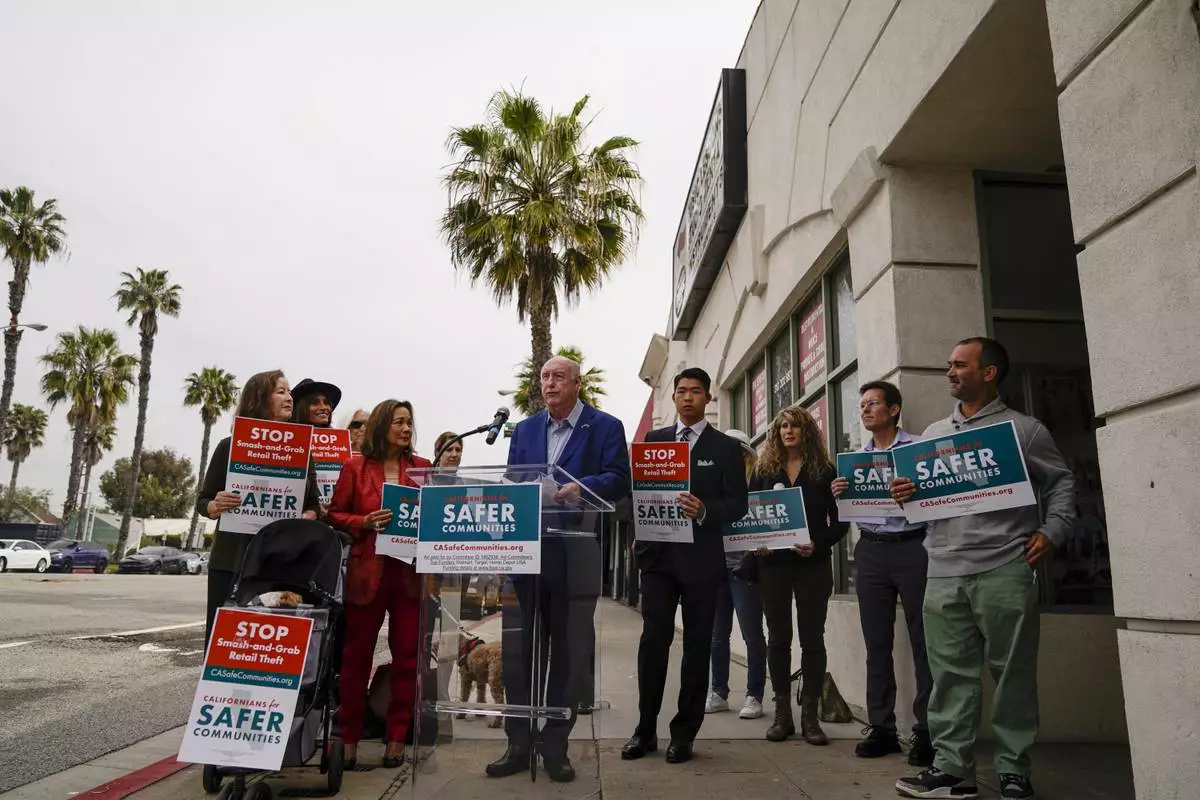
Santa Monica Mayor Phil Brock speaks at a news conference organized by the Californians for Safer Communities Coalition, Thursday, April 18, 2024, in Culver City, Calif. The coalition, backed by retailers like Walmart and Target, announced Thursday it has collected enough signatures to put a ballot measure before California voters this November to enhance criminal penalties for shoplifting and drug dealing. (AP Photo/Ryan Sun)
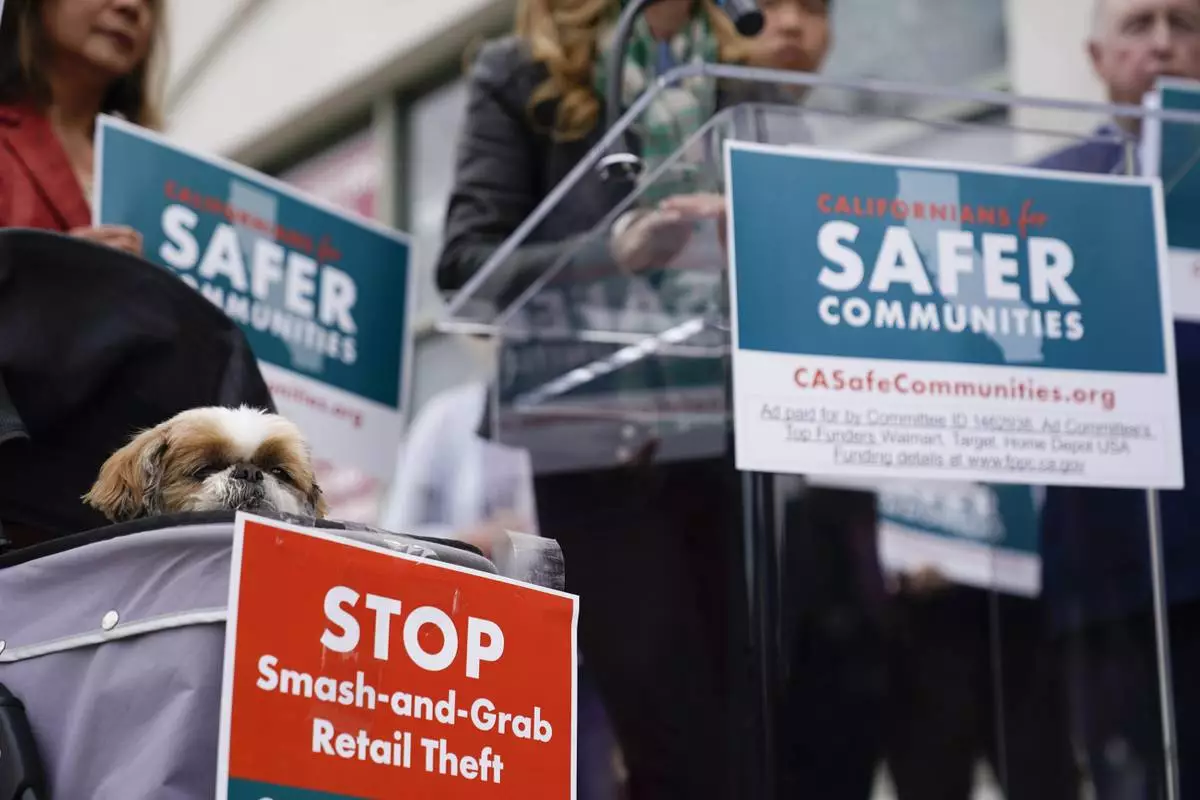
Tubby, the dog of former state Sen. Gloria Romero, D-Los Angeles, sits during a news conference organized by the Californians for Safer Communities Coalition, Thursday, April 18, 2024, in Culver City, Calif. The coalition, backed by retailers like Walmart and Target, announced Thursday it has collected enough signatures to put a ballot measure before California voters this November to enhance criminal penalties for shoplifting and drug dealing. (AP Photo/Ryan Sun)
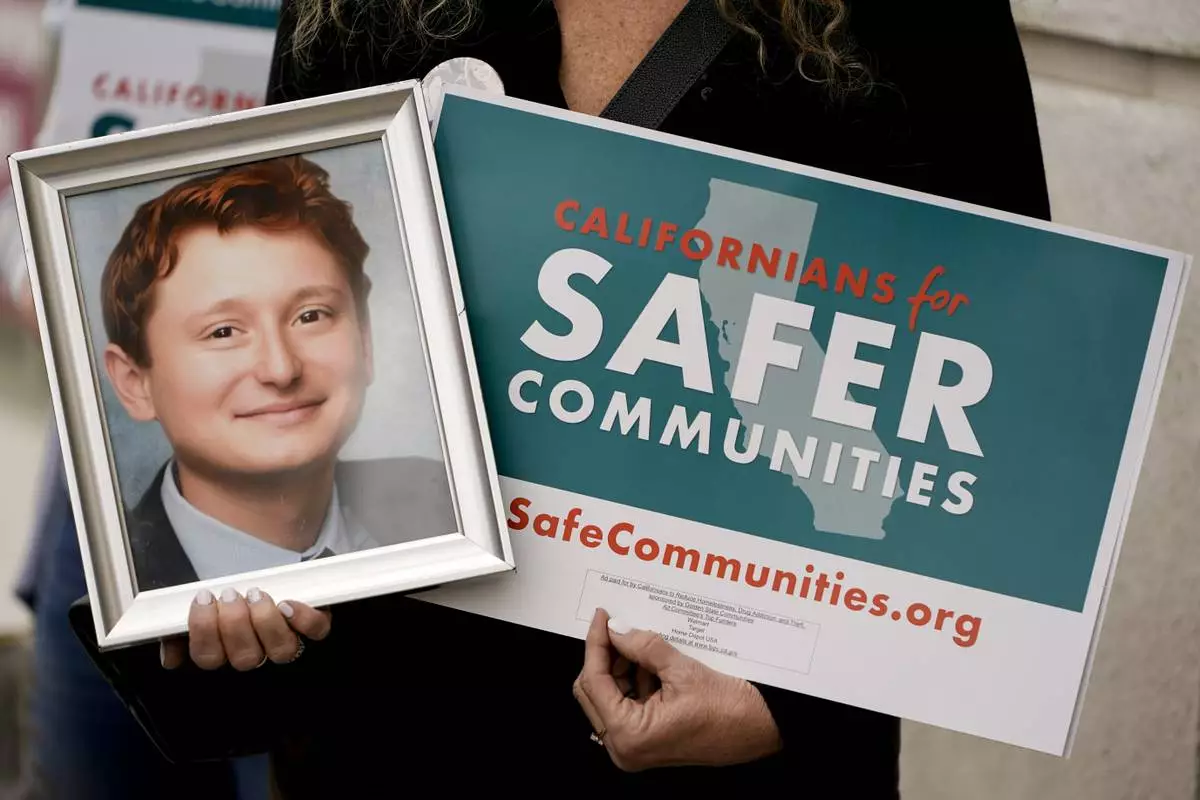
Juli Shamash holds up a photo of her son, Tyler Shamash, who passed away from a fentanyl overdose in 2018, during a news conference organized by the Californians for Safer Communities Coalition, Thursday, April 18, 2024, in Culver City, Calif. The coalition, backed by retailers like Walmart and Target, announced Thursday it has collected enough signatures to put a ballot measure before California voters this November to enhance criminal penalties for shoplifting and drug dealing. (AP Photo/Ryan Sun)

Santa Monica Mayor Phil Brock listens at a news conference organized by the Californians for Safer Communities Coalition, Thursday, April 18, 2024, in Culver City, Calif. The coalition, backed by retailers like Walmart and Target, announced Thursday it has collected enough signatures to put a ballot measure before California voters this November to enhance criminal penalties for shoplifting and drug dealing. (AP Photo/Ryan Sun)
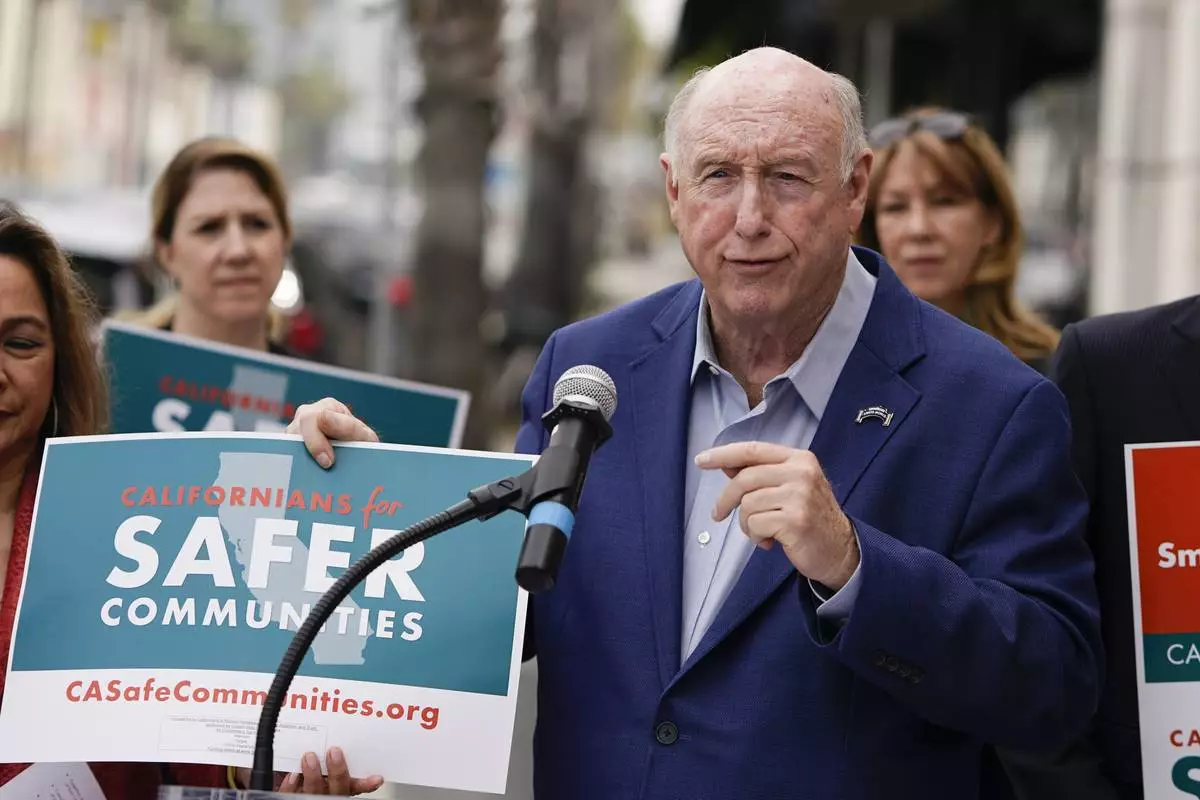
Santa Monica Mayor Phil Brock speaks at a news conference organized by the Californians for Safer Communities Coalition, Thursday, April 18, 2024, in Culver City, Calif. The coalition, backed by retailers like Walmart and Target, announced Thursday it has collected enough signatures to put a ballot measure before California voters this November to enhance criminal penalties for shoplifting and drug dealing. (AP Photo/Ryan Sun)
WASHINGTON (AP) — The U.S. Drug Enforcement Administration is moving toward reclassifying marijuana as a less dangerous drug. The Justice Department proposal would recognize the medical uses of cannabis, but wouldn't legalize it for recreational use.
The proposal would move marijuana from the “Schedule I” group to the less tightly regulated “Schedule III."
So what does that mean, and what are the implications?
Technically, nothing yet. The proposal must be reviewed by the White House Office of Management and Budget, and then undergo a public-comment period and review from an administrative judge, a potentially lengthy process.
Still, the switch is considered “paradigm-shifting, and it’s very exciting,” Vince Sliwoski, a Portland, Oregon-based cannabis and psychedelics attorney who runs well-known legal blogs on those topics, told The Associated Press when the federal Health and Human Services Department recommended the change.
“I can’t emphasize enough how big of news it is,” he said.
It came after President Joe Biden asked both HHS and the attorney general, who oversees the DEA, last year to review how marijuana was classified. Schedule I put it on par, legally, with heroin, LSD, quaaludes and ecstasy, among others.
Biden, a Democrat, supports legalizing medical marijuana for use “where appropriate, consistent with medical and scientific evidence,” White House press secretary Karine Jean-Pierre said Thursday. “That is why it is important for this independent review to go through.”
No. Schedule III drugs — which include ketamine, anabolic steroids and some acetaminophen-codeine combinations — are still controlled substances.
They're subject to various rules that allow for some medical uses, and for federal criminal prosecution of anyone who traffics in the drugs without permission.
No changes are expected to the medical marijuana programs now licensed in 38 states or the legal recreational cannabis markets in 23 states, but it's unlikely they would meet the federal production, record-keeping, prescribing and other requirements for Schedule III drugs.
There haven't been many federal prosecutions for simply possessing marijuana in recent years, even under marijuana’s current Schedule I status, but the reclassification wouldn't have an immediate impact on people already in the criminal justice system.
“Put simple, this move from Schedule I to Schedule III is not getting people out of jail,” said David Culver, senior vice president of public affairs at the U.S. Cannabis Council.
But rescheduling in itself would have some impact, particularly on research and marijuana business taxes.
Because marijuana is on Schedule I, it's been very difficult to conduct authorized clinical studies that involve administering the drug. That has created something of a Catch-22: calls for more research, but barriers to doing it. (Scientists sometimes rely instead on people’s own reports of their marijuana use.)
Schedule III drugs are easier to study, though the reclassification wouldn't immediately reverse all barriers to study.
“It’s going to be really confusing for a long time,” said Ziva Cooper, director of the University of California, Los Angeles Center for Cannabis and Cannabinoids. “When the dust has settled, I don’t know how many years from now, research will be easier.”
Among the unknowns: whether researchers will be able to study marijuana from state-licensed dispensaries and how the federal Food and Drug Administration might oversee that.
Some researchers are optimistic.
“Reducing the schedule to schedule 3 will open up the door for us to be able to conduct research with human subjects with cannabis,” said Susan Ferguson, director of University of Washington’s Addictions, Drug & Alcohol Institute in Seattle.
Under the federal tax code, businesses involved in “trafficking” in marijuana or any other Schedule I or II drug can't deduct rent, payroll or various other expenses that other businesses can write off. (Yes, at least some cannabis businesses, particularly state-licensed ones, do pay taxes to the federal government, despite its prohibition on marijuana.) Industry groups say the tax rate often ends up at 70% or more.
The deduction rule doesn't apply to Schedule III drugs, so the proposed change would cut cannabis companies' taxes substantially.
They say it would treat them like other industries and help them compete against illegal competitors that are frustrating licensees and officials in places such as New York.
“You’re going to make these state-legal programs stronger,” says Adam Goers, an executive at medical and recreational cannabis giant Columbia Care. He co-chairs a coalition of corporate and other players that’s pushing for rescheduling.
It could also mean more cannabis promotion and advertising if those costs could be deducted, according to Beau Kilmer, co-director of the RAND Drug Policy Center.
Rescheduling wouldn't directly affect another marijuana business problem: difficulty accessing banks, particularly for loans, because the federally regulated institutions are wary of the drug's legal status. The industry has been looking instead to a measure called the SAFE Banking Act. It has repeatedly passed the House but stalled in the Senate.
Indeed, there are, including the national anti-legalization group Smart Approaches to Marijuana. President Kevin Sabet, a former Obama administration drug policy official, said the HHS recommendation “flies in the face of science, reeks of politics” and gives a regrettable nod to an industry “desperately looking for legitimacy.”
Some legalization advocates say rescheduling weed is too incremental. They want to keep the focus on removing it completely from the controlled substances list, which doesn't include such items as alcohol or tobacco (they're regulated, but that's not the same).
Paul Armentano, the deputy director of the National Organization for the Reform of Marijuana Laws, said that simply reclassifying marijuana would be “perpetuating the existing divide between state and federal marijuana policies.” Minority Cannabis Business Association President Kaliko Castille said rescheduling just "re-brands prohibition," rather than giving an all-clear to state licensees and putting a definitive close to decades of arrests that disproportionately pulled in people of color.
“Schedule III is going to leave it in this kind of amorphous, mucky middle where people are not going to understand the danger of it still being federally illegal,” he said.

Cloud 9 Cannabis employee Beau McQueen, right, helps a customer, Saturday, April 13, 2024, in Arlington, Wash. The shop is one of the first dispensaries to open under the Washington Liquor and Cannabis Board's social equity program, established in efforts to remedy some of the disproportionate effects marijuana prohibition had on communities of color. (AP Photo/Lindsey Wasson)

Budtender Rey Cruz weighs cannabis for a customer at the Marijuana Paradise on Friday, April 19, 2024, in Portland, Ore. (AP Photo/Jenny Kane)

FILE - Marijuana plants are seen at a secured growing facility in Washington County, N.Y., May 12, 2023. The U.S. Drug Enforcement Administration will move to reclassify marijuana as a less dangerous drug, a historic shift to generations of American drug policy that could have wide ripple effects across the country. (AP Photo/Hans Pennink, File)








